"It has been a rare privilege to lead OCIMF for the past three years and to work with so many consummate professionals; it is my hope that our paths will cross again one day."
Director's Log
This month’s OCIMF newsletter will be my 36th and last Director’s Log. On 13 June at the 81st Executive Committee meeting, I will hand over the Director role to Rob Drysdale.
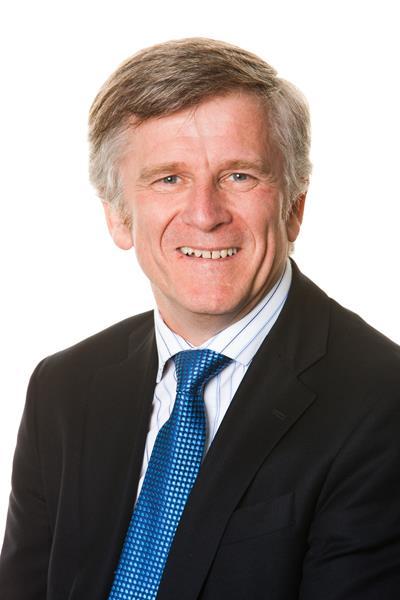
Many of you will be familiar with Rob as he has been the Senior Technical Adviser at OCIMF for two years, and I cannot think of a better person to take over the rare honour of leading this respected organisation.
We have achieved much in the last three years. At the risk of not including some of OCIMF’s many achievements, I’ll mention a few that I feel have been significant. We started and completed a revision of the Mooring Equipment Guidelines (MEG): the initial plan for a light-touch review evolved into a major revision which, I believe, is a significant safety improvement for mooring. After several years of successful operation, the Maritime Trade Information Sharing Centre – Gulf of Guinea (MTISC–GoG) pilot project was handed over to an Anglo/French military alliance, the Maritime Domain Awareness for Trade – Gulf of Guinea (MDAT–GoG), and continues to improve maritime security in the region. The Tanker Management and Self Assessment (TMSA3) revision was launched, once again to high acclaim. Finally, I would like to highlight the development of Regional Marine Forums, which have opened the doors to non-OCIMF members and which will help maritime activity to be conducted safely without harm to people or the environment. With its revised objectives launched in 2017, OCIMF and its 109 members, over 40 committees and working/focus groups and the 21-strong Secretariat all have a clear focus and common goal of improving safety and environmental performance in our industry.
When I started in 2015, the industry faced many challenges. As I hand over to Rob in 2018, he faces as many challenges as I did: the implementation of the International Maritime Organization (IMO) global sulphur limit of 0.5%m/m by 2020 and reducing our sector’s Greenhouse Gas emissions by at least 50% by 2050, compared to 2008 levels, to mention but a few.
It has been a rare privilege to lead OCIMF for the past three years and to work with so many consummate professionals; it is my hope that our paths will cross again one day.
Stay safe,

Andrew Cassels
Director OCIMF
Do you have news that you'd like to share with our readers? If so email This email address is being protected from spambots. You need JavaScript enabled to view it.
OVID QMS awarded ISO 9001:2015 certification
OCIMF is proud to announce that the Offshore Vessel Inspection Database (OVID) Quality Management System (QMS) will be awarded ISO 9001:2015 certification for the first time on 6 June 2018 by the British Standards Institution.
The Ship Inspection Report Programme (SIRE) QMS has maintained its ISO 9001:2015 certification since July 2000 and has also been awarded a re-certification under the same standard for three more years. These two ISO 9001:2015 certifications show OCIMF’s commitment to providing quality services to SIRE and OVID programme participants.

Welcome Dave Wall
OCIMF is pleased to welcome Dave Wall, who joined as Senior Technical Adviser on 1 May. Dave replaces Rob Drysdale, who will become OCIMF’s new Director on 13 June.
Dave has joined OCIMF from Chevron, where he held several leadership roles in shipping throughout the past 30 years. After completing a cadetship in the UK, Dave joined Globtik Tankers and later Kuwait Tankers as an engineering officer. In 1986 Dave joined Chevron Shipping as a Third Engineer in the international fleet and rose through the ranks to eventually sail as Chief Engineer on lightering ships and VLCCs. In 2002, Dave took on a shore-based position in San Ramon, USA as an engineering superintendent and in 2007 moved to a marine superintendent position within the newly formed Marine Assurance group.
In 2010, Dave accepted a team leader position in the marine services department and was responsible for fleet support projects as well as new construction. In 2013 Dave was asked to lead a new construction site team based in South Korea with responsibility for a 13-ship new building programme in Korea and China, which included LNG carriers, VLCCs, lightering tankers and DP shuttle tankers. In 2015, Dave moved back to San Ramon into a manager position in the Marine Services group.

Welcome Ricardo Martinez
OCIMF is pleased to welcome Ricardo Martinez. Ricardo joined OCIMF on 1 May from Chevron, replacing Joe Megeed as Technical Adviser–Engineering.
Ricardo began his career as an engineer in the US Navy. He then attended the University of New Orleans and graduated in 2004 with a Bachelor of Science degree (Honours) in Naval Architecture and Marine Engineering. Ricardo joined Chevron’s Marine Services department in 2004, providing technical support to oil, gas and shuttle tanker construction, operation, conversion, repair and recycling. During this time, he was involved in numerous projects with assignments in the People’s Republic of China, Singapore, South Korea and the United States. In 2014, he moved to Chevron’s Marine Transportation department to support the VLCC fleet management team as an Engineering Superintendent, managing day-to-day vessel operations, planned and unplanned repairs and a guarantee claims process for several new-build vessels.
Ricardo moved to the Operational Excellence/HES department as Regulatory Affairs and Advocacy Coordinator at the end of 2015. He was responsible for managing an advocacy and compliance assurance network that includes subject matter experts and members of various committees, representing the company in the industry and marine regulatory community. He has supported the OCIMF Secretariat as part of the IMO MEPC delegation in previous years and he currently serves as a member of OCIMF’s CO2 Task Force.
Please join OCIMF in welcoming both Dave and Ricardo and wishing them success in their new roles.
Farewell Joe Megeed
OCIMF bids a fond farewell to Joe Megeed, who has now ended his secondment as Technical Adviser – Engineering and returns to ConocoPhillips in Houston, USA..
OCIMF is extremely grateful for Joe’s dedication and valuable support over the last three years, and wish him every success in his future endeavours.
IMO Sulphur 2020 update
At the 70th session of the Marine Environment Protection Committee (MEPC), the International Maritime Organization (IMO) agreed to a global sulphur limit of 0.5%m/m in bunkers used on ships.
This regulation will come into effect on 1 January 2020 and will require ships to use only fuel with no more than 0.5%m/m sulphur content outside of Emission Control Areas (ECAs), unless they are fitted with an exhaust gas cleaning system, e.g. scrubbers.
The IMO will hold an intersessional meeting from 9 to 13 July 2018 to develop implementation measures and address the concerns of governments and industry. One of the items to be discussed at the intersessional meeting will be the safety impact of new and blended fuels on fuel and machinery systems. OCIMF and IPIECA have submitted a joint advocacy paper to the IMO highlighting the potential safety impact of these types of fuel on fuel and machinery systems.
OCIMF and IPIECA will also be engaging with organisations such as the International Council on Combustion Engines (CIMAC), the Energy Institute and the International Shipping Organization (ISO) to develop industry guidance that addresses the impact of new fuel blends or fuel types on machinery systems, as well as guidance on handling, storing and using these fuels. This guidance, which OCIMF and IPIECA expect to complete early in 2019, will be submitted to the IMO for information and for any action deemed appropriate.
OCIMF will continue to focus on the regulation’s safety aspects and will work with industry partners and governments to raise awareness of safety issues and, where possible, provide guidance on potential solutions.
The OCIMF IMO delegation will attend the intersessional meeting in July. All members are invited to join the delegation at the IMO or to contact Sam Megwa, Chief Representative to IMO, at This email address is being protected from spambots. You need JavaScript enabled to view it., with any safety concerns or issues in relation to the regulation’s implementation.
MTIS site refresh
The Marine Terminal Information System (MTIS) website launched a fresh new look in May.
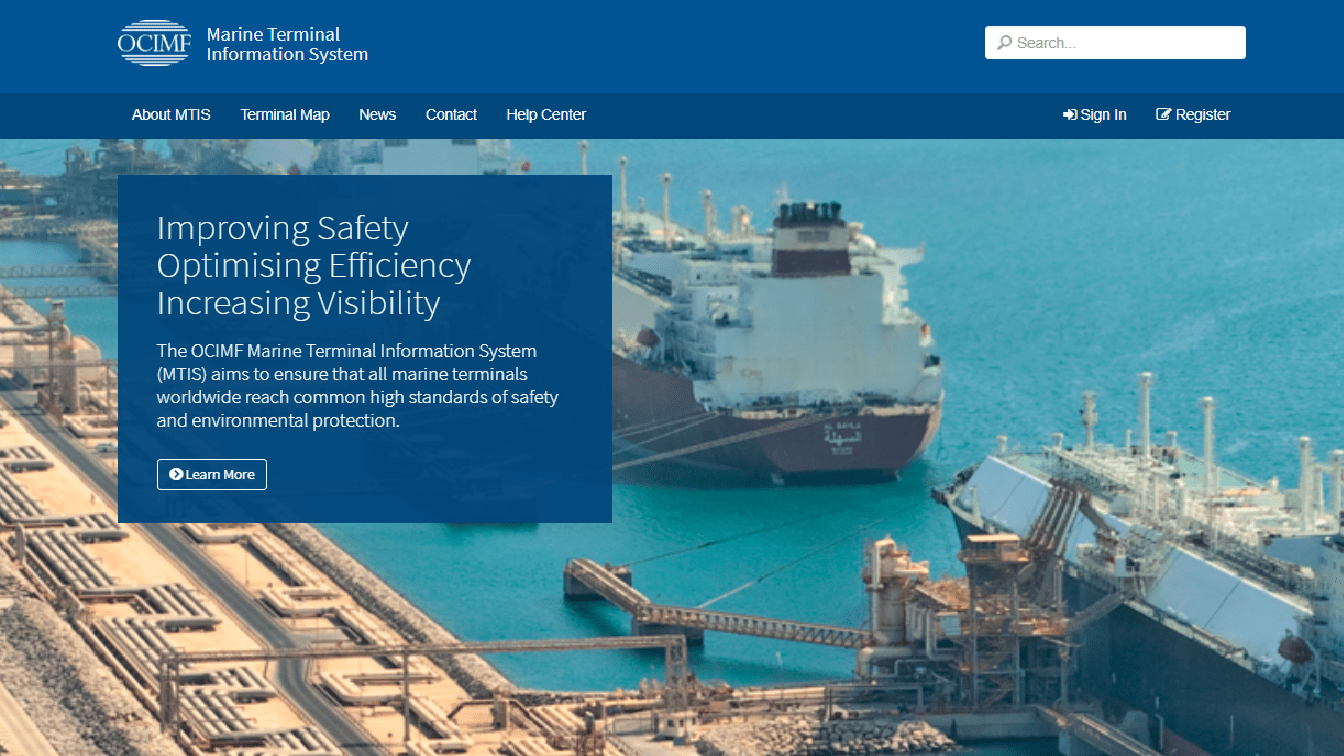
With the aim of increasing the number of terminals registered to MTIS, the site now clearly showcases the features and benefits of the programme and the value it adds to terminal safety.
Throughout 2017, MTIS underwent an extensive review – its biggest overhaul since it launched in 2011. Registered terminal operators were invited to provide OCIMF with their feedback and comments. The review also considered the registration process for terminal operators and the usability of the online account.
MTIS will undergo further development throughout 2018 as OCIMF continues to improve global ship-to-shore safety management.
MTMSA Site Verification Guidelines
Copies of the Marine Terminal Management and Self Assessment (MTMSA) Site Verification Guidelines (SVG), as well as the Shore Terminal SVG and Floating Terminal SVG, can now be accessed from within a terminal operator’s MTIS account.
The Marine Terminal Management and Self Assessment (MTMSA) was developed by OCIMF as a standardised tool for terminal operators to assess and improve the effectiveness of their management systems, with emphasis on safe management of the ship/shore interface and industry best practice. The SVG were released in February 2018 to help assessors review the self-populated MTMSA against the actual terminal site. Providing a logical question flow as the assessor moves around a terminal site, the SVG outlines:
- A common baseline of questions to prevent ambiguity.
- Applicable field evidence that contributes to a review of specific key performance indicators.
- Management system evaluation verification guidance.
Terminal operators can keep a completed SVG as documented evidence of their self assessment.
Oceans Beyond Piracy report launched
Oceans Beyond Piracy launched their report, The State of Maritime Piracy 2017, in London on 23 May.
The report summary states:
- Piracy events off the Horn of Africa doubled last year compared to the year before, indicating that Somali criminal networks are still capable of sophisticated attacks.
- Overall incidents in the Latin America and Caribbean region increased by 160%, indicating the opportunistic nature of actors in the region.
- Piracy continues to pose a threat in the Gulf of Guinea despite a broad array of countermeasures implemented by coastal states and maritime security companies.
- Kidnap-for-ransom incidents in Asia decreased by 80%, in large part due to the effective cooperation by regional law enforcement actors.
The full report is available on the Oceans Beyond Piracy website.
Maritime Security Snippets
MSSC meeting in Singapore
The Maritime Security Sub-committee (MSSC) held their first meeting of 2018 in Singapore to coincide with Singapore Maritime Week. Ampol hosted the meeting at their offices, and the MSSC thanks Hemant Berry for his support.
Members focussed on reviewing draft security work for the new SIRE VIQ and prioritising work for the coming year. The group was joined by a guest speaker, Colonel David Foo from the Singapore Maritime Port Authority, who provided insight into how Singapore is tackling drone operation in the port area and outer anchorages. David Bancroft (Chevron; pictured centre-right) handed the MSSC helm to John Evans (Shell; pictured centre-left). The group also welcomed a new Vice Chair: Shaikh Rahim from IMT.
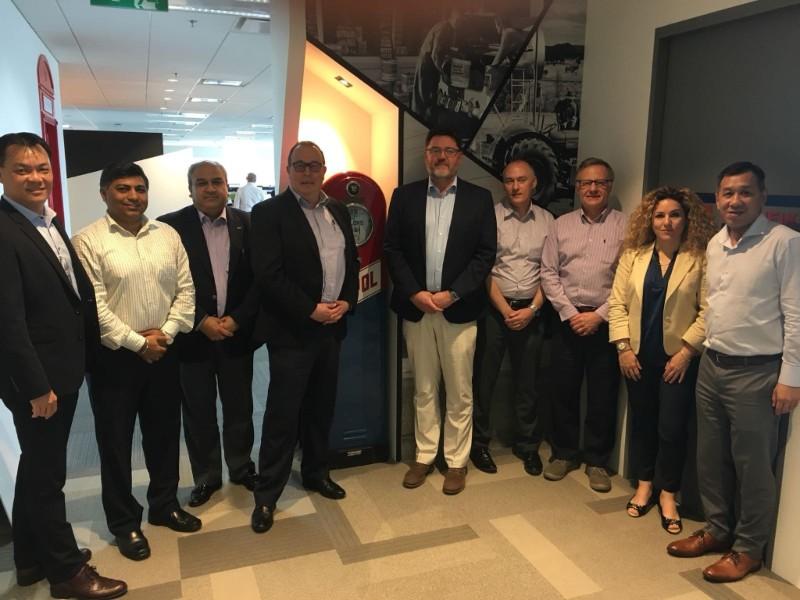
MSSC visit to the IFC
While in Singapore, the MSSC visited the Singapore Information Fusion Centre (IFC) at the Changi Naval Base. The Officer in Charge, Lt. Col. Raymond Ong (pictured third from the left), gave a presentation on the role of the IFC, its responsibilities and the value of its partnership with industry. The MSSC were impressed with the IFC’s analytical capability and saw value in a future role for an MNLO. More information on the IFC can be found on the Singapore Ministry of Defence website.
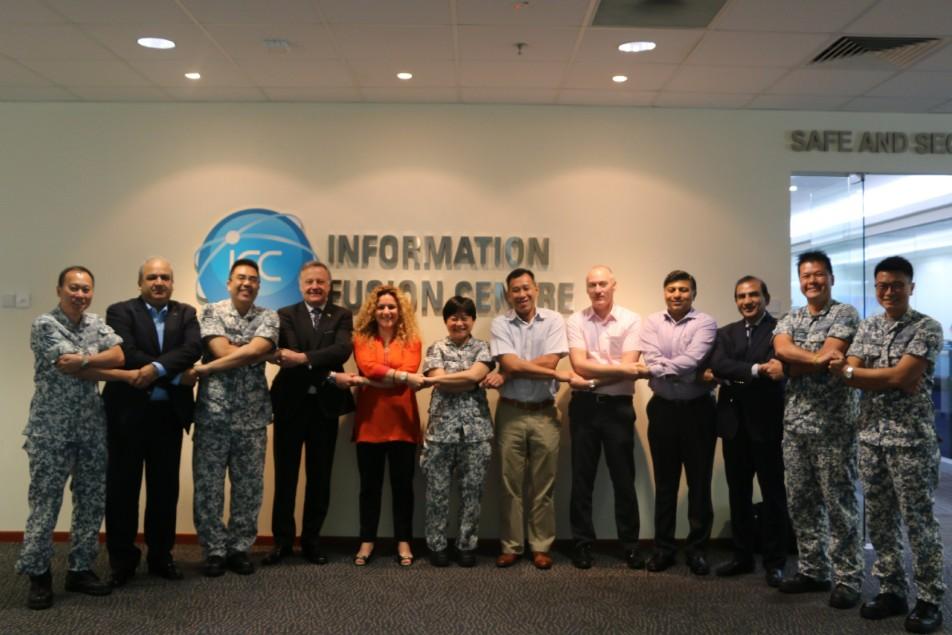
ReCAAP roundtable
During Singapore Maritime Week, OCIMF attended a roundtable hosted by the Regional Cooperation Agreement on Combating Piracy and Armed Robbery against Ships in Asia (ReCAAP) and the S. Rajaratnam School of International Studies (RSIS). The aim of this event was to debate the need for a single maritime global reporting centre. The group also discussed a paper to be presented to the IMO Maritime Safety Committee in May on the standardisation of reporting global piracy and armed robbery events.
Any members interested in joining the MSSC should contact the Security Adviser, Russell Pegg at This email address is being protected from spambots. You need JavaScript enabled to view it..
IMO MSC 99 update
The IMO held the 99th session of the Maritime Safety Committee (MSC 99) on 16–25 May. The meeting’s key highlights are as follows
Maritime Autonomous Surface Ships (MASS).
The IMO will carry out a scoping exercise to identify how existing IMO instruments should be changed to regulate MASS. MASS have been described as the next revolutionary change in the maritime industry, and some cargo ships are expected to be operating by 2021. There is currently no plan to develop a new regulatory framework for MASS. Some delegates requested to temporarily ban MASS, but this was not supported by member governments. An initial list of mandatory regulations for the scoping exercise was developed at MSC 99, and a target completion date of 2020 was agreed. The MSC also established a Correspondence Group on MASS to suggest improvements at MSC 100 and consider the need for guidelines for MASS trials. During its 105th session in April, the IMO Legal Committee decided to carry out a similar regulatory scoping exercise on MASS, but with a target completion date of 2022. The Committee noted that no member state has so far expressed willingness to register MASS or to allow these vessels into its waters or ports.
Carriage of more than 12 industrial personnel on international voyages.
This regulation will apply safety standards to vessels certified as cargo ships with more than 12 special or industrial personnel. The Committee has not yet established a uniform definition of the term “international voyages”.
Non-SOLAS ships in polar waters.
A new work item to develop both mandatory and non-mandatory safety requirements for non-SOLAS vessels operating in polar waters was approved, which will apply to fishing vessels, yachts, and cargo ships between 300 to 500 gross tonnage. The scope of the mandatory requirements is still being considered. The Committee instructed the Ship Design and Construction Sub-Committee (SDC) to start work on the non-mandatory requirements, which only apply to fishing vessels and yachts.
Iridium mobile satellite system in the Global Maritime Distress and Safety System (GMDSS).
The Iridium Safety Voice is a secure satellite-based communication service used as an alternative to high-frequency radio systems. Following extensive debates and interventions, the Iridium Safety Voice was recognised by the IMO as a mobile satellite communication service in the GMDSS, subject to the United States and Iridium addressing any outstanding implementation issues under the oversight of the International Mobile Satellite Organization.
OCIMF will assess the safety implications of the decisions made at MSC 99 and take actions in line with its mission.
Asia Pacific Regional Marine Forum
OCIMF is pleased to announce a provisional agenda for the first Asia Pacific Regional Marine Forum, which will be held on 14 June in Tokyo, Japan.
Presentations will include the following topics:
Mooring Equipment Guidelines, Fourth Edition (MEG4) and the IMO
- MEG4 publication status, website and key messages.
- Recommendations from the vessel Zarga incident report.
- Current draft SOLAS regulations and IMO guidance documents.
OCIMF programmes: SIRE/TMSA and OVID
- SIRE/TMSA and OVID updates from OCIMF.
- The importance of vessel inspection and vetting.
- Ship operator views of vetting and SIRE.
- Barging in the Asia Pacific region.
Best practice and lessons learned
- Piracy and security.
- Lessons learned from incidents: machinery breakdown and damage to fishing nets in Japanese waters.
OCIMF publications update
- Updates on forthcoming OCIMF publications, including MEG4, the International Safety Guide for Oil Tankers and Terminals (ISGOTT), Cargo Guidelines for F(P)SOs and Guidelines for Offshore Tanker Operations.
Forum Q&A session
Full details of the agenda will be available on our website shortly. The Asia Pacific Regional Marine Forum will take place on Thursday 14 June at the Imperial Hotel in Tokyo, with an evening reception on Wednesday 13 June. OCIMF looks forward to seeing you in Tokyo.
Registration for the Asia Pacific Regional Marine Forum has now closed, but a few places are still available for the Europe and Africa Regional Marine Forum on 19 June in Rome, Italy.
European Inland and Coastal Barging Focus Group
The fifth meeting of the European Inland and Coastal Barging Focus Group (EICBFG) was hosted by OCIMF in London, UK on 17–18 May.
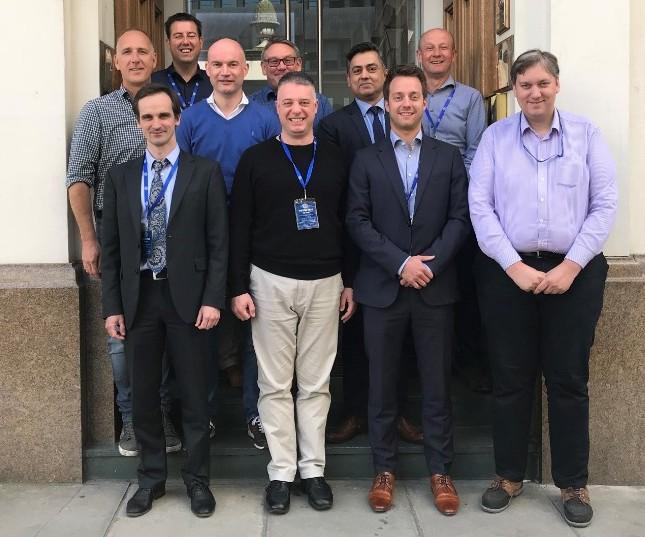
The meeting was attended by nine members. The group reviewed:
- Statistics and feedback affecting the Ship Inspection Report Programme (SIRE).
- Planned updates to the European Barge Inspection Questionnaire (BIQ).
- Issues related to inspector training and auditing.
- Mooring incidents on barges.
Members also discussed wider matters involving compliance with the General Data Protection Regulation, an overview of the work being done by the European Committee for drawing up Standards in the field of Inland Navigation (CESNI), and the mapping of the European Barge Inspection System with the Barge Particulars Questionnaire (BPQ).
The next meeting will be held 29–30 November in London, UK.

